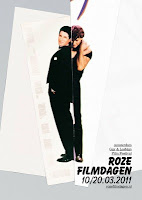
Les Témoins (The Witnesses) is another fine artwork by French director André Téchiné that continues to examine relationships in times of stress and through areas of rough travel. As written by Téchiné, Laurent Guyot, and Viviane Zingg this film is a love story and a social commentary on life in 1984 when AIDS raised its ugly head and disrupted lives, hopes and relationships. What could have been a heavy-handed woeful tale is instead a story about ordinary people and how the spectre of the then 'new disease' affected a small group of friends. In the intimacy of the story there is an opportunity to reflect and to see more clearly the atmosphere of that time in history.
Sarah (Emmanuelle Béart) is a writer of children's books married to Mehdi (Sami Bouajila), a member of the Paris police force vice squad. They have an open marriage and have just given birth to a baby boy - a factor that disrupts their separate lives while conflicting their married life. Sarah has a physician friend Adrien (Michel Blanc, so memorable in his role in 'Monsieur Hire') who is gay, and while he is older, he still longs for the company of young men. Adrien meets the young catering student Manu (Johan Libéreau), a lad whose sexual appetite is satisfied by trysts in parks, back rooms of bars, etc. Manu and his opera singer sister Julie (Julie Depardieu) live modestly in a sleazy hotel cum brothel that is under surveillance by Mehdi. Adrien and Manu strike up a friendship and are invited to join Sarah and Mehdi to Sarah's mother's cabin by the sea and while there a relationship between Manu and Mehdi begins, one that will become an affair in secret.
A strange disease comes to public attention and it is Adrien who is in charge of the investigation of the disease now called AIDS. Though Adrien's ties with Manu have become platonic while Manu see Mehdi daily, Adrien is the first to notice lesions on Manu, lesions that are the hallmark of AIDS. How this discovery affects the lives of each of the characters we have met (the 'witnesses' to a very important time in our history) serves as the crux of the story - part tragedy and part a torch of resilience the weaves the story to a close in an honest, touching but never maudlin manner.
The acting is consistently excellent, the sort of ensemble acting that keeps the focus on the message of the film rather than on individual attention to characters. The movie is beautifully photographed by Julien Hirsch and the musical score by Philippe Sarde wisely blends excerpts from Vivaldi and Mozart with original music that recalls the 1980s. This is yet another triumph for André Téchiné - a film that deserves the widest possible audience.
Sarah (Emmanuelle Béart) is a writer of children's books married to Mehdi (Sami Bouajila), a member of the Paris police force vice squad. They have an open marriage and have just given birth to a baby boy - a factor that disrupts their separate lives while conflicting their married life. Sarah has a physician friend Adrien (Michel Blanc, so memorable in his role in 'Monsieur Hire') who is gay, and while he is older, he still longs for the company of young men. Adrien meets the young catering student Manu (Johan Libéreau), a lad whose sexual appetite is satisfied by trysts in parks, back rooms of bars, etc. Manu and his opera singer sister Julie (Julie Depardieu) live modestly in a sleazy hotel cum brothel that is under surveillance by Mehdi. Adrien and Manu strike up a friendship and are invited to join Sarah and Mehdi to Sarah's mother's cabin by the sea and while there a relationship between Manu and Mehdi begins, one that will become an affair in secret.
A strange disease comes to public attention and it is Adrien who is in charge of the investigation of the disease now called AIDS. Though Adrien's ties with Manu have become platonic while Manu see Mehdi daily, Adrien is the first to notice lesions on Manu, lesions that are the hallmark of AIDS. How this discovery affects the lives of each of the characters we have met (the 'witnesses' to a very important time in our history) serves as the crux of the story - part tragedy and part a torch of resilience the weaves the story to a close in an honest, touching but never maudlin manner.
The acting is consistently excellent, the sort of ensemble acting that keeps the focus on the message of the film rather than on individual attention to characters. The movie is beautifully photographed by Julien Hirsch and the musical score by Philippe Sarde wisely blends excerpts from Vivaldi and Mozart with original music that recalls the 1980s. This is yet another triumph for André Téchiné - a film that deserves the widest possible audience.
Frans drama over een groep vrienden in het Parijs van de jaren tachtig, waar ze te maken krijgen met de eerste uitbraak van de AIDS epidemie
De twintigjarige Manu woont voorlopig bij zijn zus Julie op een klein hotelkamertje in Parijs en gaat 's avonds vaak op stap. Zo leert hij de vijftigjarige homoseksuele arts Adrien en de pasgetrouwde Mehdi en Sarah (Emmanuelle Béart). Zonder het te beseffen brengt Manu heel wat teweeg in het gevoelsleven van zijn zingende zus, de extravagante dokter en het stel jonggehuwden. Bij ieder van hen maakt hij hun diepste verlangens los...
Het scenario voor het Franse drama 'Les témoins' schreef regisseur André Téchiné ('Les temps qui changent') samen met Laurent Guyot en Viviane Zingg. Begin 2007 was de film in de race voor een Gouden Beer op het Film Festival van Berlijn.










